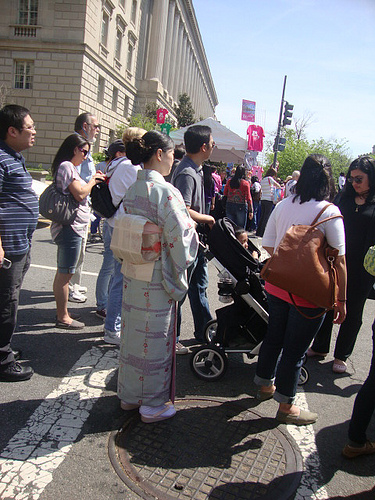
By Melanie Aguilar-Rojas
UJW Staff Writer
WASHINGTON – The National Cherry Blossom Festival Parade drew a fashionably creative crowd Saturday.
Whether a visitor or local, many wore kimonos or dressed in spring colors and floral prints to watch the parade commemorating the gift of thousands of cherry blossomtrees that Japan gave Washington in 1912 to mark their friendship.
Jeremy Monet was dressed in a traditional Japanese kimono that he bought several years ago in Japan. He had just gotten to the parade and was searching for something to do while making observations about the attire in the crowd.
“I saw a guy in a Japanese shirt [and] people in full kimonos,” Monet said. “I like to see people get in the spirit.”
Paris Makell of Upper Marlboro, Md., was also looking through the crowd. She made her way to the parade on Metro dressed in a black hand-made kimono with large pink flowers printed on it.
“I really like Japanese culture and I saw a Wa Lolita outfit at a Japanese convention. I thought ‘I have to have something like that,’” Makell said.
She began to make the dress two years ago and it took her three months to finish it. It consisted of the kimono and a black skirt underneath to create the Wa Lolita look.
“I got some weird stares on Metro,” Makell said with a laugh. “I don’t think a lot of people expect to see a black girl in a kimono.”
Another festival attendee, Lauren Klaasse, made her kimono in February for the Katsucon, a fan convention for anime, manga and Japanese culture enthusiasts. She attended the parade for similar reasons.
“I like to see Japan and America together,” she said. “It is also a nice way to kick off
spring and this nice weather.”
Her dress was made from navy blue fabric and adorned with a fuschia belt; but she wished for “fancier stuff.”
Samantha Luna owns quite a few kimonos. For the parade she chose a bright green one with pink flowers. Tucked in the waistband was a pink paper fan that she could easily pulled out to beat the heat off her face. “There are many layers,” Luna said about the kimono.
And there was one kimono with cherry blossoms printed on it. Makiko, who chose not to give her last name, said the light turquoise kimono was a gift from her mother in Japan.
“Today is a very good day. Many people smiled at me,” Makiko said.


